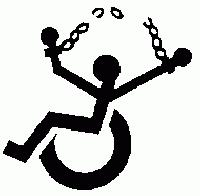Politically Correct
 I don't like the word "retard". Yes, I used it a lot in my previous life, but it was been beaten out of my vocabulary, as was the word "handicapped" and "disabled". It would be worked out of yours, too, if someone (or some people) kept smacking you every time it leaked from your lips.
I don't like the word "retard". Yes, I used it a lot in my previous life, but it was been beaten out of my vocabulary, as was the word "handicapped" and "disabled". It would be worked out of yours, too, if someone (or some people) kept smacking you every time it leaked from your lips.
Let's give a little background:
I work for a non-profit whose main purpose is to train the up and coming medical professionals how to take leadership and advocacy positions for children with disabilities (we're now adding on genetics and family members, yay!). When I started working there 3 years ago, those 3 words were a large part of my vocabulary because I didn't realize what they meant. My boss and 2 associates would literally hit me every time they even heard it start to move across my tongue. They didn't leave bruises, but it wasn't a light tap either.
So I stopped using them pretty quick.
The 2 women who are my associates both have a child with a disability. B. has a now 23 year old son with Autism Spectrum Disorder (ASD) and E. has a 7 year old daughter with Down Syndrome. B. has been the greatest asset to my learning new things about persons with disabilities, terminology that is currently being tested for better inclusiveness and for realizing how shitty Virginia is when it comes to paying for that inclusion (or for attempting it for that matter).
B. is the one who first told me that "retarded" assumes the person with said disability choose to be *inflicted* with whatever their disability was/is, or something happened to them later in life to make them that way, whereas if you say "brain damaged," (which is a term her son prefers to use) the general population begins to understand they were in fact born that way. It was B.'s son who helped her understand this concept because, 20 years ago, no one had even heard of ASD. The term handicapped has a history not involved in the disability movement whatsoever. Originally, it was a term coined for those participating in a game of chance, then somehow switched to mean a beggar on a street corner with cap in hand. Isn't that interesting? Somehow, somewhere, another word was warped from its original meaning.
The term handicapped has a history not involved in the disability movement whatsoever. Originally, it was a term coined for those participating in a game of chance, then somehow switched to mean a beggar on a street corner with cap in hand. Isn't that interesting? Somehow, somewhere, another word was warped from its original meaning.
(All of this wonderfully insightful learning prompted me to do a presentation on Feminist Disability Theory and how it was, or has been, portrayed (it hasn't) in literature for my Feminist Literary Theory class a few semesters ago. Last spring, I took on the newly formed Disability Continuum theory for a paper in my Women's Studies Sr. Seminar which pissed my professor off immensely. So much so, we actually argued over it when I was presenting my paper topic to the point where I was defending my paper instead of presenting it in summary form.)
So people of the blogosphere, please practice complete inclusion by using people-first language and ditching the "retarded" comments altogether. This includes "fucktard" which is equally as common. Would you stand for someone using racist, sexist or homophobic language in your presence? Then you shouldn't stand for someone using ableist language in your presence either. It's really that simple. And if you need any help, you know where to find me.
Also, do feel free to pass this around to anyone who uses any of the above terms a little too loosely, I can take the heat. Let me know when you do by dropping me a line in comments or shooting me an email. thanks.
(links for Pissed off Crip and Break the Chains pictures and wonderful Cafe' Press stuff.)


<< Home